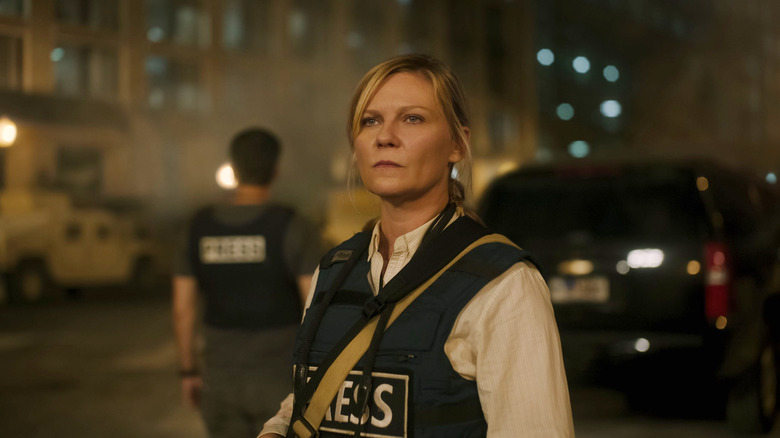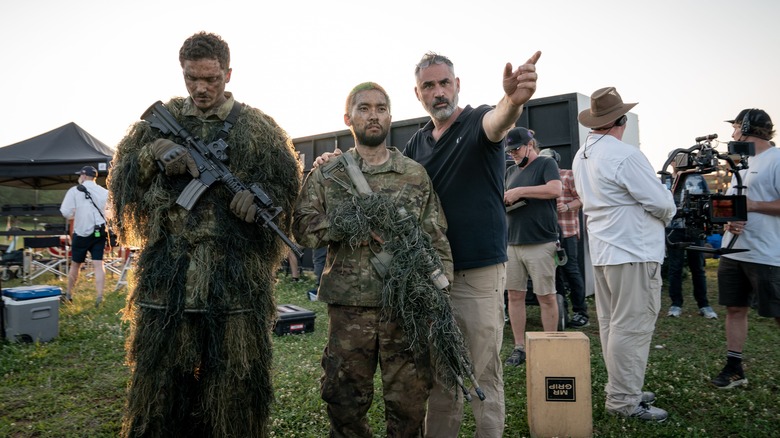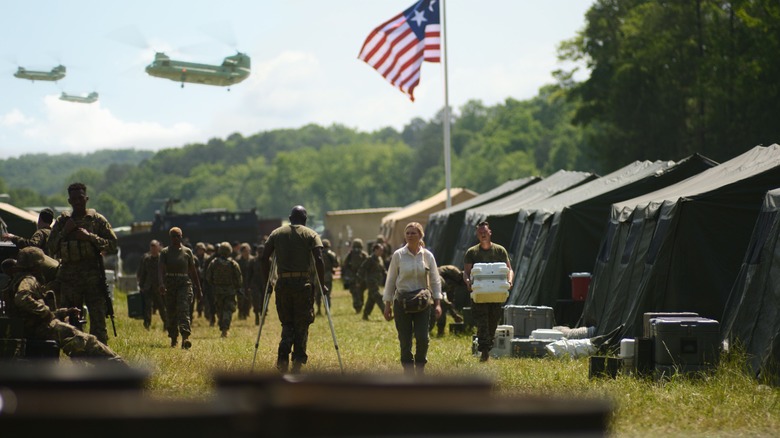Why Texas And California Are Allied Against The United States Government In Civil War
You know what's the great thing about most movies? They're fiction, which means writers and directors can do whatever the heck they want. Simple! Okay, to put that a little less bluntly, creatives should ideally have free rein to put the needs of the script ahead of anything else and simply tell the best story that they possibly can. It feels like we as audiences used to understand that concept, which is why debates over so-called "plot holes" like why the Eagles didn't fly the Fellowship into Mordor or why Bruce Wayne doesn't just fund social services instead of beating up low-level criminals on the streets never pass the smell test for me. The obvious answer is that there would be no movie if they did — or, at least, not a very entertaining one.
Well, it's with a heavy heart that we report the logic police have come for writer/director Alex Garland over his upcoming film, "Civil War." (Be sure to read /Film's review by Jacob Hall here.) For months, A24's marketing team has taken its usual approach of combining multiple harrowing trailers with targeted social media posts to raise further interest in the movie. Since the premise has to do with the United States descending into another war pitting entire regions of the country against one another across bitterly divided political lines, the studio naturally thought a handy graphic on Twitter (only nerds call it "X") laying out the various alliances would prove helpful.
Pledge your allegiance. #CivilWarMovie pic.twitter.com/XRYuLoGBYR
— A24 (@A24) April 2, 2024
Well, they thought wrong. A bunch of people got weirdly riled up by the idea that political rivals like, say, Texas and California would ever even dream of teaming up together. And now Garland himself has had to wade into the fray and explain exactly why he did things the way he did.
Turns out it was, in fact, intentional
Despite the title, "Civil War" isn't actually a Ken Burns documentary, believe it or not. Who knew? Half of the fun of a movie like this is that it takes eerily familiar trappings (in this case, a hopelessly divided American nation) and puts a unique genre twist on them, as opposed to rigidly abiding by the red state vs blue state geography that makes up current American politics. That's the main point Alex Garland attempts to get across in a recent interview with The Hollywood Reporter, which caught up with the filmmaker at an early screening of the movie and asked him about the layout of his fictionalized, not-so-United States.
Funny enough, Garland actually implies the entire (over)reaction to this proves the exact point he was trying to make, saying that he made this choice "...partly to get around a kind of reflexive, polarizing position that people might fall into. That's one thing, but actually that's not the main thing. The main thing is to do with how the President is presented and what can be inferred from that."
That President is played by Nick Offerman and happens to be the divisive leader presiding over the ongoing mess. We won't spoil anything here, but with various rebellions rising up against the federal government, it's clear that he's taken quite a few unpopular and increasingly extreme measures to maintain power — measures that would lead to one-time partisans putting their differences aside and reaching across the aisle, perhaps? Although the exact details of the civil war may remain fuzzy, Garland goes on to note:
"Then it's saying that two states that have a different political position have said, 'Our political difference is less important than this.'"
'This is not supposed to represent the world as it is'
Hmm, so you're telling me that simply waiting for the movie to come out and trusting that it might actually explain its own world-building might've been better than formulating hot takes based on a single image? There might be an important lesson in there for the rest of us, but who can say for sure!
In any case, one of the other stars of "Civil War" also weighed in on this unexpectedly hot-button issue. THR quotes Nick Offerman as saying that this shocking alliance between Texas and California "...serves a few purposes, but one of them is to immediately say, 'This is not supposed to represent the world as it is.' But I think it also serves to say the way the world is working these days, anything is possible and so quickly."
Of course, it's worth noting that this movie didn't come together in the span of a few weeks, with the express intent of commenting on the highly-charged atmosphere of this current moment — it's actually been in the works for well over four years, according to Garland. Perhaps it says more about us as a collective human race that the passage of time has done nothing to make this any less relevant. As the "Ex Machina" and "Annihilation" director put it:
"I think the film was written really not just about this country, about a weird state we're in to do with division and polarization and extremism, the things that flow from populism. At the moment I wrote it, I don't think I imagined it would take four years to get to this point, but also if it did take four years, that things would be so similar."
"Civil War" arrives in theaters April 12, 2024.


